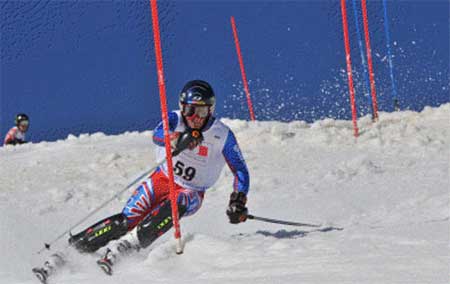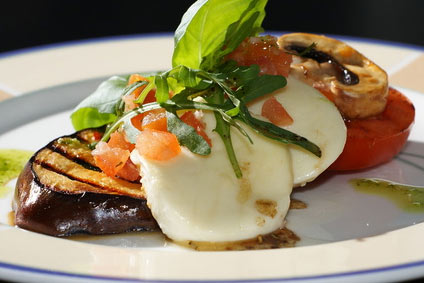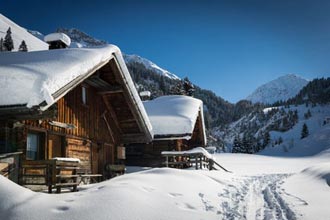
My journey to the top
Some people become so completely obsessed with skiing that they give up their job and spend their life savings on living, breathing and learning everything snow.
The ski industry is a fascinating place to work. Here at Best Ski Jobs we have been involved for eight years now, finding lots of amazing jobs and discovering thousands of talented seasonaires. While we cover just about every type of ski job you can think of, the following page is going to focus exclusively upon the most sought after seasonaire in the mountains - the chalet chef!
 Skiing is a high energy sport and every skier needs plenty of fuel to keep them fit for a week on the slopes. Resort centre cafes, slope-side restaurants and mountain-top eateries keep people fed during the day, but for those traveling from the UK and staying in a catered chalet, a hearty breakfast, afternoon tea and a multi-course evening meal are a big part of the experience. These ski chalets charge their guests premium prices, and in return they offer a luxury holiday. Chalets often build their reputations and ensure repeat business through the quality of their food, so a good ski chalet chef is vital to their success. A quick look on chaletfinder or chaletsdirect and the number of chefs required to keep the millions of seasonal skiers fed becomes clear.
Skiing is a high energy sport and every skier needs plenty of fuel to keep them fit for a week on the slopes. Resort centre cafes, slope-side restaurants and mountain-top eateries keep people fed during the day, but for those traveling from the UK and staying in a catered chalet, a hearty breakfast, afternoon tea and a multi-course evening meal are a big part of the experience. These ski chalets charge their guests premium prices, and in return they offer a luxury holiday. Chalets often build their reputations and ensure repeat business through the quality of their food, so a good ski chalet chef is vital to their success. A quick look on chaletfinder or chaletsdirect and the number of chefs required to keep the millions of seasonal skiers fed becomes clear.
The types of chefs that we get asked to find range from competent cooks through to Michelin star chefs. Whether you are a Commis Chefs, and have completed your formal training and gone on to gain some limited experience of working in a professional kitchen, perhaps in a gastro pub or hotel, or a seasoned professional head chef, there is a strong possibility we can find you work in a ski resort for the coming season.
We will talk more about specific professional kitchen qualifications, personal attributes and legal requirements below, but more often than not you will be asked to meet the following criteria:
- UK passport, bank account and National Insurance number Chalets operate in different ways, taking guests on a self catering basis, right through to all inclusive luxury, and everything inbetween.
Chalets operate in different ways, taking guests on a self catering basis, right through to all inclusive luxury, and everything inbetween.
There are plenty of ski chalet chef roles out there for people who will be required to turn out a hearty fry-up each morning, or ladle out steaming bowls of spaghetti and meatballs in the evening, you may even be suitable for this if your experience is limited to dinner parties or you have a chalet cookery course certificate.
Putting yourself in the guest's shoes, if your little group have paid £50,000 to hire a luxury ski chalet for a week, you aren't going to be overly impressed unless the food you are served is above and beyond what you could make for yourself given an hour in the kitchen.
The level of experience we get asked to provide varies but typically your work history and qualifications should be along the following lines:
 You will have experience working in a good quality hotel or restaurant, preferably with a one or two AA Rosette award. Alternatives include fine dining, private catering or yacht catering experience, or simply a solid couple of previous seasons as a ski chalet chef.
You will have experience working in a good quality hotel or restaurant, preferably with a one or two AA Rosette award. Alternatives include fine dining, private catering or yacht catering experience, or simply a solid couple of previous seasons as a ski chalet chef.
 You'll be at least a sous chef, though if you have head chef experience in a Michelin star restaurant, then you should be able to walk into most jobs you apply for!
You'll be at least a sous chef, though if you have head chef experience in a Michelin star restaurant, then you should be able to walk into most jobs you apply for!
 In terms of qualifications, you will hold a recognised catering qualification such as NVQ and City and Guilds Chef.
In terms of qualifications, you will hold a recognised catering qualification such as NVQ and City and Guilds Chef.
 As the chef, you will be responsible for breakfast, afternoon snacks, and a four course evening dinner. Your tasks include planning the week's menu, shopping for the ingredients, preparing and cooking the meals, and often helping serve the food to the chalet guests. You will also be responsible for clearing up, stock taking and ordering, and you may be required to help out with other tasks for the company.
As the chef, you will be responsible for breakfast, afternoon snacks, and a four course evening dinner. Your tasks include planning the week's menu, shopping for the ingredients, preparing and cooking the meals, and often helping serve the food to the chalet guests. You will also be responsible for clearing up, stock taking and ordering, and you may be required to help out with other tasks for the company.
Out in resort, with such small teams, everyone is expected to pitch in to keep the chalet running smoothly. The scope of the job will vary from company to company, depending upon how many staff they employ. Some chalets expect the chalet host to be the cook, the front of house point of contact with the guests, and also the cleaner. If you are applying for this type of role then you are unlikely to be asked to be a highly experienced professional chef.
More likely you are going to be recruited to concentrate specifically on feeding people! This may be as a stand alone chef, or as one half of the chalet couple role. When you see a couple role advertised, one of you should have a chef background, and the other will have experience of customer service.
As a chalet chef you will be required to have the ability to prepare and serve great quality meals to a strict budget. You may need to submit weekly menu plans and prepare accounts. You will have to bring your own ideas to the menus, and be comfortable in dealing with different dietary requirements.
Your daily working hours will vary but generally you will be on duty between 7am and 11am and again from 5pm to 10pm, each day. You will receive one full day off per week and some companies even offer a bit of holiday, though this is not typical.
 Lots of outdoor and seasonal jobs begin by saying there is no such thing as a typical day. For you as a chalet chef, there is, and it is split into two parts; morning and evening. So from the moment you put the pain au chocolates in the oven through until you put the remains of the cheese course back in the fridge, let's look at what happens in between.
Lots of outdoor and seasonal jobs begin by saying there is no such thing as a typical day. For you as a chalet chef, there is, and it is split into two parts; morning and evening. So from the moment you put the pain au chocolates in the oven through until you put the remains of the cheese course back in the fridge, let's look at what happens in between.
7am: You will be off to an early start, making your way to the chalet in time to get started on the customers' breakfasts. Your accommodation is either going to be in chalet itself or a short distance away.
7am to 8am: Breakfast preparation, including a cooked option. Most chalets serve a cold continental breakfast buffet, plus a hot cooked option. Service is overseen by the chalet host, allowing you to crack on with making a start on afternoon tea, and prep for the evening meal.
8am to 11am: Breakfast service. Guests will usually head out for the ski slopes shortly after 9am, so they'll want feeding before that. Once the guests are out of the chalet you can continue prep for afternoon tea, which includes making cakes or biscuits. Get this all laid out ready for their return and then you are free to follow them out of the door and into resort.
11am to 4pm: Time to take advantage of your free lift pass and equipment hire!
5pm to 7pm: Make sure you arrive back before the guests, in time to oversee the afternoon or high tea that you prepared earlier in the day. You may also need to make the main meal, consisting of a couple of courses, for any children you have staying at your chalet as this is the time they will eat.
7pm to 10pm: The main evening meal will begin around 7pm, with aperitifs and canapes served to the guests by the chalet host, before they take their seats for the main meal. The evening meals are 4 courses: a starter, a main course, a desert course, and a cheese course. Unlike a professional kitchen where you cook for the entire evening, in a ski chalet you will treat service much like a home dinner party, appearing between courses to interact with the guests and assist the chalet host.
10pm: Once the meal is over, your guests are full of coffee, and you have cleaned the kitchen in preparation for the following day, your day is over.
 The following is a fairly comprehensive, but not exhaustive list of requirements that may be important before you are able to take up employment with the ski companies you will encounter when seeking work as a chalet chef.
The following is a fairly comprehensive, but not exhaustive list of requirements that may be important before you are able to take up employment with the ski companies you will encounter when seeking work as a chalet chef.
You must have a UK passport, bank account and National Insurance number and have worked in the UK. This is all to do with employment and tax laws, and how salaries are paid to seasonaires. Some companies also require you have a UK address.
Sometimes you may find your application is acceptable if you hold an EU passport, but please note, most companies do not accept working visas alone. These requirements are due to French and Austrian employment law, where only EU passport holders who are resident in the UK with a permanent UK National Insurance number can be employed. As the job requires you to interact with English speaking guests, you should be fluent in the language.
More often than not in the job requirements you will see employers state that applicants must be at least 21 years of age. Part of the chef's role will be to buy ingredients, and to do this you are going to need to hold a driving licence. In order to get motor insurance for you to be able to drive in the mountains, you need to be 21 years old. While completely possible to work as a chef aged 21, we find that most chalets will employ people who are older than this simply due to the level of experience they are looking for on your CV.
Professionally, you are going to need to hold a food safety and food hygiene certificate such as HACCP.
Desirable Attributes:
Basic language skills such as French would be preferable
Have lived, worked or travelled abroad
Confident and self-motivated, especially as you may be working alone
 Want to know what it pays to work as a chef in a ski resort? Seasonaires do not head for the mountains to make their fortunes - that's not what a ski season is all about. That said, the chef is actually one of the better paid roles in resort. For a basic salary you are looking at around £150 to £250 per week. You'll also get accommodation, usually a shared room with other staff, and your meals provided. You also get flights to and from resort, plus comprehensive medical insurance.
Want to know what it pays to work as a chef in a ski resort? Seasonaires do not head for the mountains to make their fortunes - that's not what a ski season is all about. That said, the chef is actually one of the better paid roles in resort. For a basic salary you are looking at around £150 to £250 per week. You'll also get accommodation, usually a shared room with other staff, and your meals provided. You also get flights to and from resort, plus comprehensive medical insurance.
Unlike a typical restaurant kitchen where you have to judge the response to your food by the number of clean plates coming back into the kitchen, as a chalet chef you get to chat to the guests about the food. The feedback is instant and your diners much more accessible. You will need to be more outgoing of course, and some front of house or public facing job experience would enhance your chances of employment.
While you are there to work, there is no way you can ignore the jaw dropping beauty of the natural environment that surrounds you. Luxury chalets are often situated right by the side of the piste, which means that when you have completed your morning duties and prep for the afternoon and evening, a nice chunk of the middle of the day is your leisure time.
All the chalet companies we have ever worked with will provide their employees with ski or snowboard equipment hire, lift passes, and the all important medical insurance. So if you don't spend your down-time having fun on the slopes, you're doing it wrong!
Working as a ski chef is a lot of work for not a lot of pay, especially when you compare it to what you could be earning back in the UK. But there is more to life than making money. Maybe you want to indulge a passion for snowsports, or perhaps you are after the kind of creative freedom and level of experience that you cannot get at home. Running your own kitchen, having to think for yourself, getting involved in everything from stock control to budget and menu planning, looks seriously impressive on your CV, and will boost your confidence as a chef. You also get to show off your creative talents, often with a generous food budget.
If all this sounds like your cup of tea, head over to our dedicated ski resort catering page to start applying for this season's current vacancies!